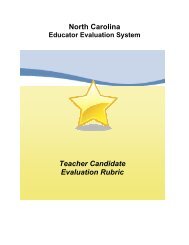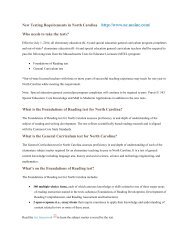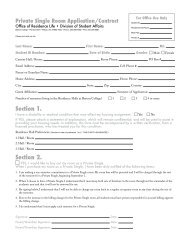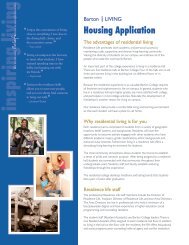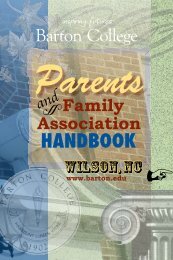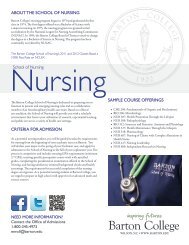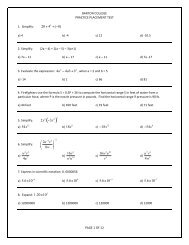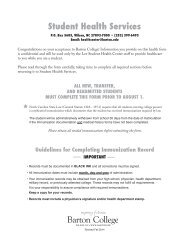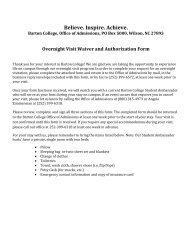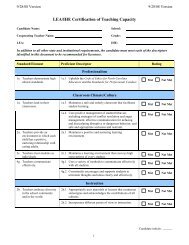- Page 1 and 2:
BARTON COLLEGEcatalog20132014
- Page 3 and 4:
Table of Contents4 Introduction to
- Page 5 and 6:
4 Introduction to the CollegeBarton
- Page 7 and 8:
6 Introduction to the CollegeStatem
- Page 9 and 10:
8 Admissions• Barton recommends s
- Page 11 and 12:
10 AdmissionsNon-Degree Enrollment
- Page 14 and 15:
13 AdmissionsCollege. “Good stand
- Page 16 and 17:
15 College ExpensesSummer Sessions
- Page 18 and 19:
17 College ExpensesTraditional Day
- Page 20 and 21:
19 Financial AidFINANCIAL AIDMaking
- Page 24 and 25:
23 Financial AidA student intereste
- Page 26 and 27:
25 Financial AidReinstatement of Fi
- Page 28 and 29:
27 Financial AidEndowed Scholarship
- Page 30 and 31:
29 Financial Aidannually to one or
- Page 32 and 33:
31 Financial AidThe Charlotte and D
- Page 34 and 35:
33 Financial AidThe Walter Brown En
- Page 36 and 37:
35 Financial AidThe Bruce and Mary
- Page 38 and 39:
37 Financial Aidactivities for the
- Page 40 and 41:
39 Financial Aidshould be considere
- Page 42 and 43:
41 Financial Aidto a student(s) in
- Page 44 and 45:
43 Financial Aidis awarded to a Wil
- Page 46 and 47:
45 Financial AidThe Jim and Joan He
- Page 48 and 49:
47 Financial AidThe Bertha C. Johns
- Page 50 and 51:
49 Financial Aidannually to one or
- Page 52 and 53:
51 Financial AidThe William P. Nixo
- Page 54 and 55:
53 Financial AidThe President’s C
- Page 56 and 57:
55 Financial AidThe Eric W. Sellers
- Page 58 and 59:
57 Financial Aidor higher (or ACT e
- Page 60 and 61:
59 Financial Aiddegree and is selec
- Page 62 and 63:
61 Financial AidThe P.C. Yelverton
- Page 64 and 65:
63 Student LifeGreek OrganizationsT
- Page 66 and 67:
65 Student LifeBookstoreThe Booksto
- Page 68 and 69:
67 Student Lifeimportance which mus
- Page 70 and 71:
69 Degree Requirements• Academic
- Page 72 and 73:
71 Degree Requirements• Applicati
- Page 74 and 75:
73 Degree RequirementsIV has satisf
- Page 76 and 77:
75 Degree RequirementsENG 232. Surv
- Page 78 and 79:
77 Degree RequirementsLifetime Acti
- Page 80 and 81:
79 Honors and AwardsHONORS AND AWAR
- Page 82 and 83:
81 Honors and AwardsThe Rotary Cups
- Page 84 and 85:
83 Academic RegulationsACADEMIC REG
- Page 86 and 87:
85 Academic Regulationsclick on “
- Page 88 and 89:
87 Academic Regulations• Any stud
- Page 90 and 91:
89 Academic Regulationschair or dea
- Page 92 and 93:
91 Academic RegulationsConcurrent E
- Page 94 and 95:
93 Academic RegulationsCollege Alge
- Page 96 and 97:
95 Academic RegulationsFailing grad
- Page 98 and 99:
97 Academic RegulationsThe criteria
- Page 100 and 101:
99 Academic Regulationsshould be at
- Page 102 and 103:
101 Academic RegulationsMembers of
- Page 104 and 105:
103 Academic Regulationspersons or
- Page 106 and 107: 105 Special Academic ProgramsHonors
- Page 108 and 109: 107 Special Academic ProgramsAdmiss
- Page 110 and 111: 109 Special Academic ProgramsActivS
- Page 112 and 113: 111 Special Academic Programs• A
- Page 114 and 115: 113 Arts and Sciences: ArtMajor and
- Page 116 and 117: 115 Arts and Sciences: ArtFaculty:
- Page 118 and 119: 117 Arts and Sciences: ArtSpecial A
- Page 120 and 121: 119 Arts and Sciences: ArtAuditing
- Page 122 and 123: 121 Arts and Sciences: ArtART 230.
- Page 124 and 125: 123 Arts and Sciences: ArtART 311.
- Page 126 and 127: 125 Arts and Sciences: ArtART 380.
- Page 128 and 129: 127 Arts and Sciences: ArtART 460.
- Page 130 and 131: 129 Arts and Sciences: Communicatio
- Page 132 and 133: 131 Arts and Sciences: Communicatio
- Page 134 and 135: 133 Arts and Sciences: Communicatio
- Page 136 and 137: 135 Arts and Sciences: Communicatio
- Page 138 and 139: 137 Arts and Sciences: Communicatio
- Page 140 and 141: 139 Arts and Sciences: English and
- Page 142 and 143: 141 Arts and Sciences: English and
- Page 144 and 145: 143 Arts and Sciences: English and
- Page 146 and 147: 145 Arts and Sciences: English and
- Page 148 and 149: 147 Arts and Sciences: English and
- Page 150 and 151: 149 Arts and Sciences: History and
- Page 152 and 153: 151 Arts and Sciences: History and
- Page 154 and 155: 153 Arts and Sciences: History and
- Page 158 and 159: 157 Arts and Sciences: History and
- Page 160 and 161: 159 Arts and Sciences: History and
- Page 162 and 163: 161 Arts and Sciences: History and
- Page 164 and 165: 163 Arts and Sciences: Physical Edu
- Page 166 and 167: 165 Arts and Sciences: Physical Edu
- Page 168 and 169: 167 Arts and Sciences: Physical Edu
- Page 170 and 171: 169 Arts and Sciences: Physical Edu
- Page 172 and 173: 171 Arts and Sciences: Physical Edu
- Page 174 and 175: 173 Arts and Sciences: Physical Edu
- Page 176 and 177: 175 Arts and Sciences: Physical Edu
- Page 178 and 179: 177 Arts and Sciences: Physical Edu
- Page 180 and 181: 179 Arts and Sciences: Physical Edu
- Page 182 and 183: 181 Arts and Sciences: Physical Edu
- Page 184 and 185: 183 Arts and Sciences: Physical Edu
- Page 186 and 187: 185 Arts and Sciences: Physical Edu
- Page 188 and 189: 187 Arts and Sciences: Religion and
- Page 190 and 191: 189 Arts and Sciences: Religion and
- Page 192 and 193: 191 Arts and Sciences: Science, Mat
- Page 194 and 195: 193 Arts and Sciences: Science, Mat
- Page 196 and 197: 195 Arts and Sciences: Science, Mat
- Page 198 and 199: 197 Arts and Sciences: Science, Mat
- Page 200 and 201: 199 Arts and Sciences: Science, Mat
- Page 202 and 203: 201 Arts and Sciences: Science, Mat
- Page 204 and 205: 203 Arts and Sciences: Science, Mat
- Page 206 and 207:
205 Arts and Sciences: Science, Mat
- Page 208 and 209:
207 Arts and Sciences: Science, Mat
- Page 210 and 211:
209 Arts and Sciences: Science, Mat
- Page 212 and 213:
211 Arts and Sciences: Science, Mat
- Page 214 and 215:
213 BusinessSCHOOL OF BUSINESSInter
- Page 216 and 217:
215 BusinessBusiness Management Maj
- Page 218 and 219:
217 BusinessACC 340. Governmental a
- Page 220 and 221:
219 BusinessBUS 360. Case Studies i
- Page 222 and 223:
221 BusinessCIS 202. Computer Progr
- Page 224 and 225:
223 BusinessFNC 340. Advanced Manag
- Page 226 and 227:
225 BusinessMGT 345. Managerial Eth
- Page 228 and 229:
227 EducationBarton College offers
- Page 230 and 231:
229 EducationStage IBefore taking S
- Page 232 and 233:
231 Education3. Have met all progra
- Page 234 and 235:
233 EducationStudent Teaching in Se
- Page 236 and 237:
235 Educationindicating success in
- Page 238 and 239:
237 EducationMiddle School Educatio
- Page 240 and 241:
239 Education• During the Profess
- Page 242 and 243:
241 EducationSpecial Education: Gen
- Page 244 and 245:
243 EducationEDU 205. Introduction
- Page 246 and 247:
245 EducationEDU 332. Methods of Te
- Page 248 and 249:
247 EducationEDU 411. Methods and M
- Page 250 and 251:
249 EducationEDU 451. Classroom Man
- Page 252 and 253:
251 EducationGraduate Courses of In
- Page 254 and 255:
253 EducationEDU 530. Integrated Ma
- Page 256 and 257:
255 Nursingcare to clients at varyi
- Page 258 and 259:
257 NursingThe following describes
- Page 260 and 261:
259 NursingNUR 213. Health Assessme
- Page 262 and 263:
261 NursingNUR 401. Introduction to
- Page 264 and 265:
263 Social WorkSCHOOL OF SOCIAL WOR
- Page 266 and 267:
265 Social WorkApplications should
- Page 268 and 269:
267 Social WorkSWK 305. Marriage an
- Page 270 and 271:
269 Social WorkSWK 453. Social Work
- Page 272 and 273:
271 College PersonnelTodd Wilkinson
- Page 274 and 275:
273 College PersonnelStudent Affair
- Page 276 and 277:
275 College PersonnelNorma Williams
- Page 278 and 279:
277 College PersonnelJames A. Carpe
- Page 280 and 281:
279 College PersonnelRichard A. Lee
- Page 282 and 283:
281 College PersonnelFaculty Emerit
- Page 284 and 285:
283 Academic CalendarAPP FALL SEMES
- Page 286 and 287:
285 IndexINDEXAAcademic Advisement,
- Page 288 and 289:
287 IndexGeneral Education Capstone
- Page 290 and 291:
289 IndexSSatisfactory Academic Pro
- Page 292 and 293:
291 FacilitiesWillis N. Hackney Lib
- Page 294 and 295:
293 FacilitiesWenger Hall (1970) is
- Page 296 and 297:
295 Campus MapAthletic ComplexCorbe





